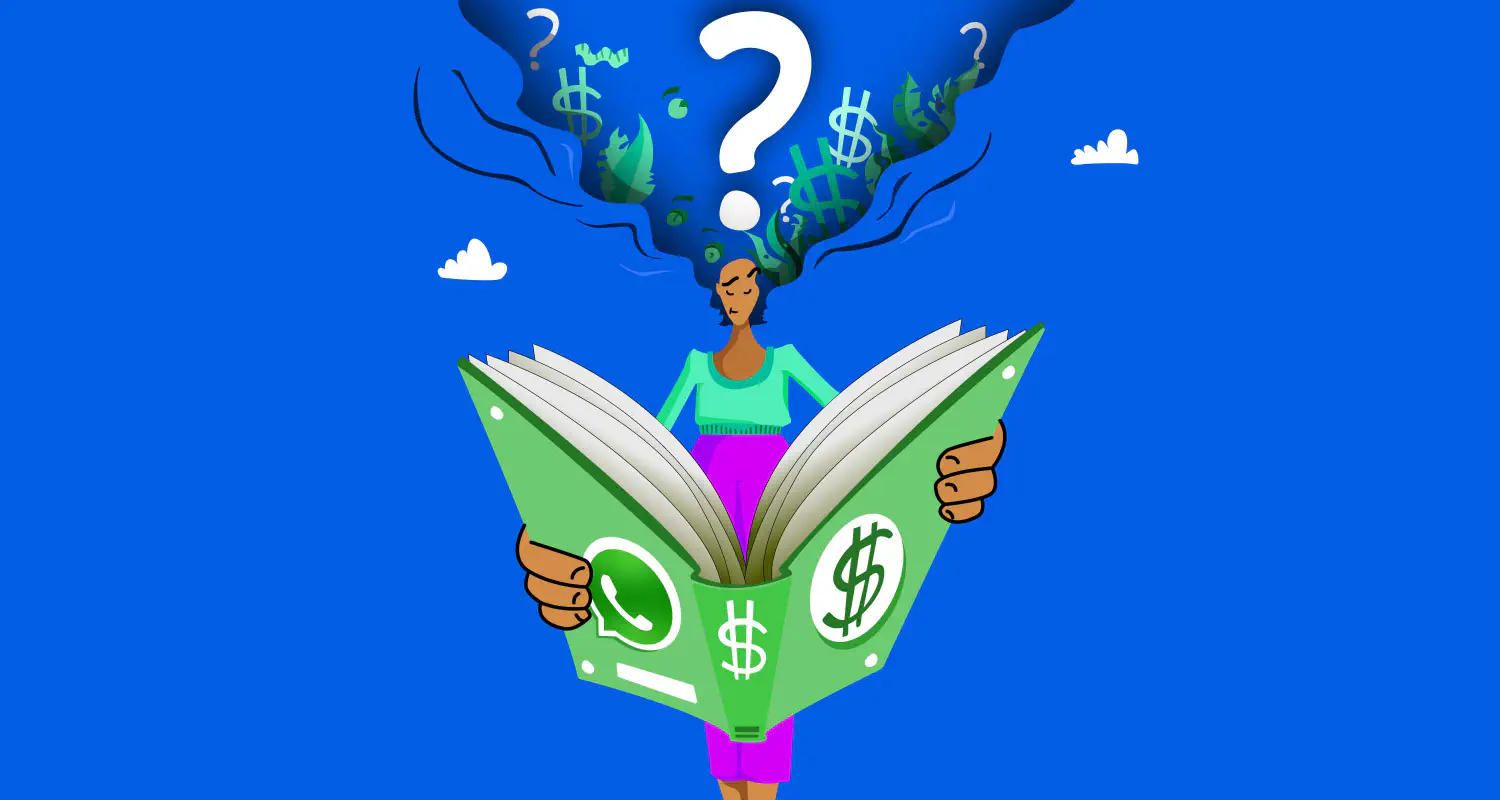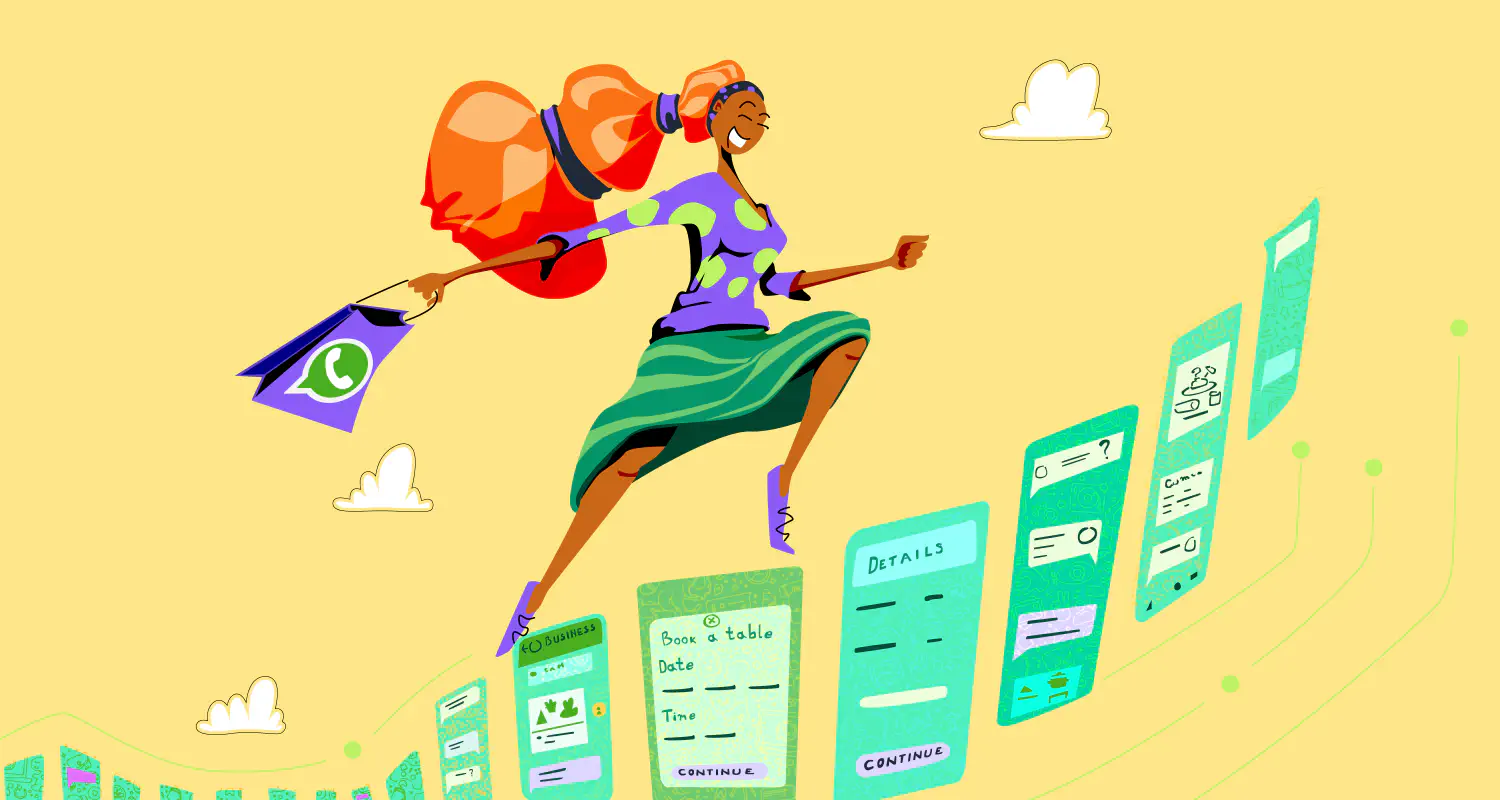3 Proven Strategies to Reduce WhatsApp Business Costs: Updated Guide
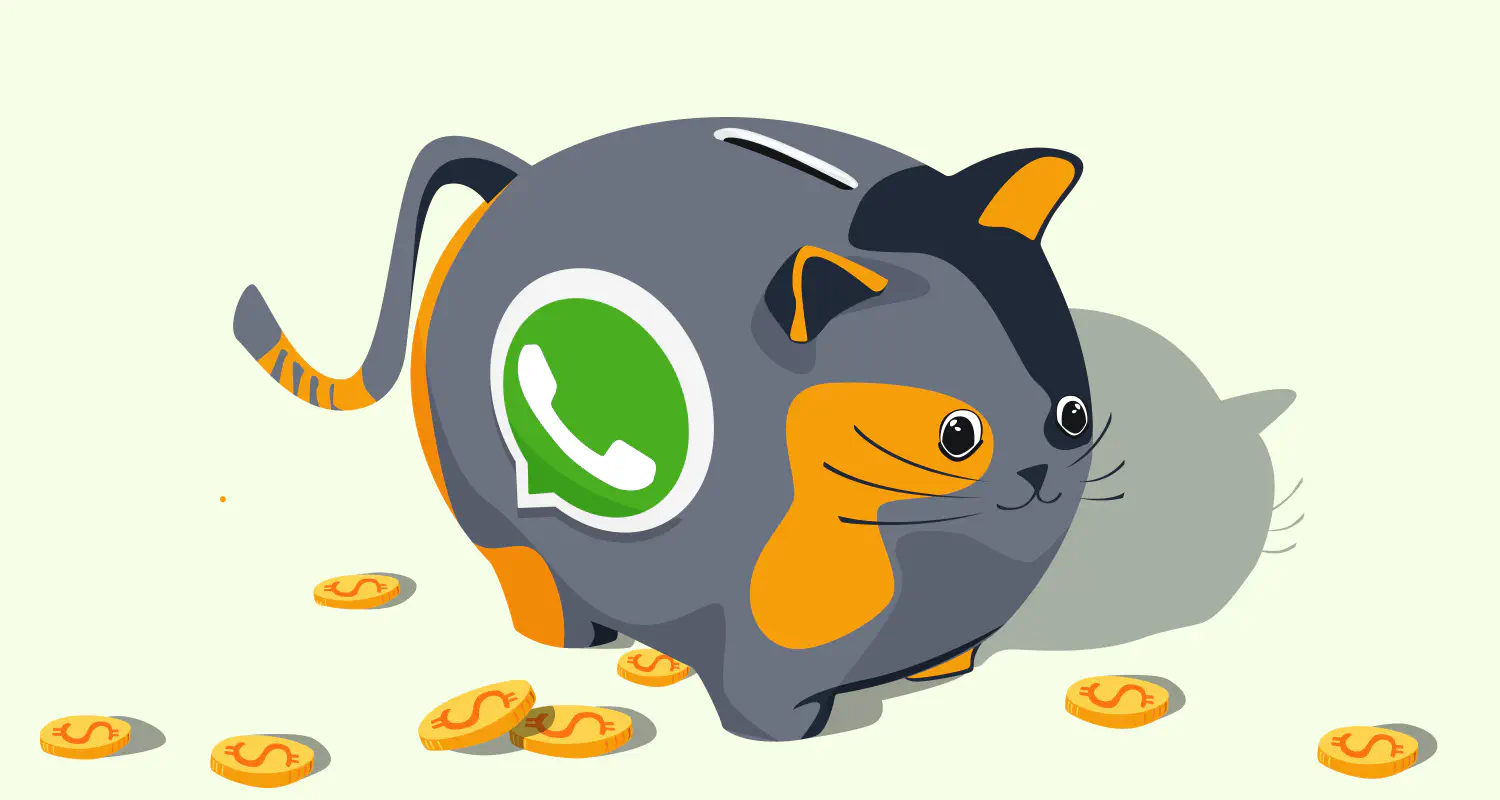
Want to cut down on your WhatsApp Business API costs? You’re in the right place. In this article, we’ll cover:
- What affects your monthly WhatsApp bill
- How to reduce your costs
- How to measure ROI on your WhatsApp fees
Overview of WhatsApp Business API cost factors
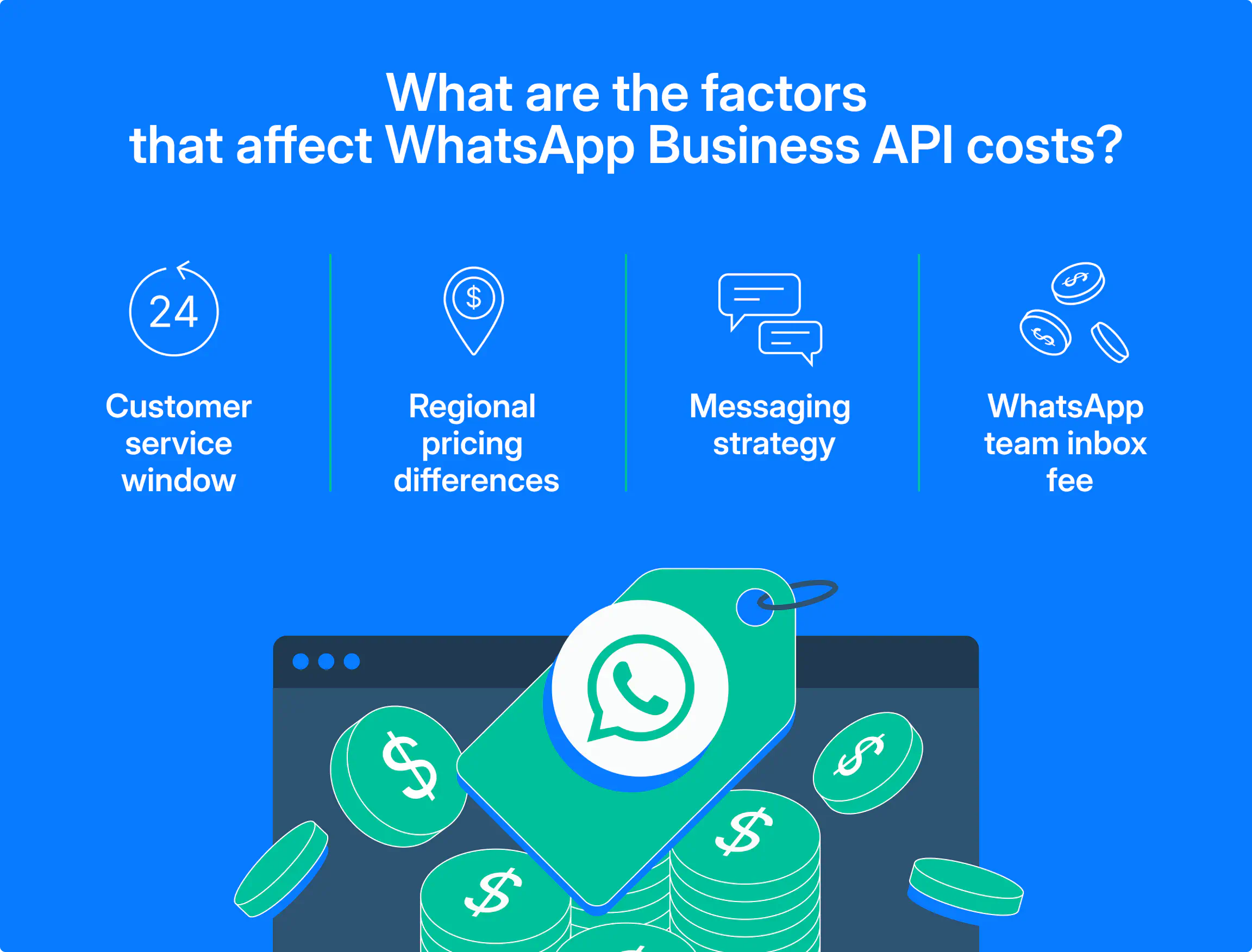
If you’re wondering what influences WhatsApp pricing for businesses, it boils down to these key factors:
Customer service window
All conversations initiated by customers are free. Replying during the 24-hour window won’t cost you a thing. The 24-hour customer service window opens when a customer sends a message to a business, and it lasts for 24 hours from their last message.
Regional pricing differences
WhatsApp API costs can vary depending on the country or region where your customers are located. Local telecom rates and market dynamics can influence Meta’s pricing for different markets. For businesses trying to figure out regional trends and customer behavior, Playwright can support market research by automating data collection from local sources.
Messaging strategy
With Meta’s recent pricing update, all inbound customer conversations are now free. Starting in April 2025, an additional change will take effect: the current conversation-based pricing model will be replaced with a message-based pricing model.
Here’s a breakdown of which messages are free and which incur charges:
Free WhatsApp messages:
- Non-template replies within the 24-hour window.
- Follow-up replies for Inbound conversations.
- Chatbot replies within the customer service window.
Paid WhatsApp messages:
- Marketing templates for promotions.
- Utility templates for updates sent outside the 24-hour window.
- Authentication templates for verification.
WhatsApp team inbox fee
If you want to use the WhatsApp API, you’d need to code the interface yourself or use a customer communication platform like Rasayel. The price of WhatsApp platforms is typically based on the number of users.
Having a clear understanding of these cost factors will allow you to plan your communication strategy and stay within budget.
Best practices for reducing WhatsApp API costs
Now that we cleared up what factors influence the amount of money you pay for the WhatsApp Business API, let’s cover the best practices to reduce those costs.
Encourage user-initiated conversations
User-initiated conversations are free within the 24-hour window, so inviting customers to reach out first can help minimize costs. Here are some ways it can help you reduce costs:
- Use proactive engagement tactics like email and social media
- Add a WhatsApp widget on your website to let users message you directly.
- Run Click-to-WhatsApp ads to invite customers to start a chat directly from Facebook or Instagram.
- Deploy a WhatsApp chatbot to respond as soon as customers reach out.
Focus on message relevance and quality
Keep your messages relevant and to the point. It helps you avoid unnecessary back-and-forth and prevents triggering new, paid interactions. Each message you send should have a clear purpose—address a customer’s need, provide a key update, or share a valuable promotion.
When your messages hit the mark, it also creates a better experience for your customers because it keeps things clear and engaging. Quality over quantity always wins when it comes to messaging!
Training and team education
Make sure your sales and support teams understand the new pricing model, like which messages are free and when charges apply. Encourage them to respond as quickly as possible, within the customer service window to avoid extra charges.
Additionally, you can set up chatbots to handle common queries when certain criteria are met - specific keywords, or at specific times of the day.
How to measure and maximize WhatsApp ROI
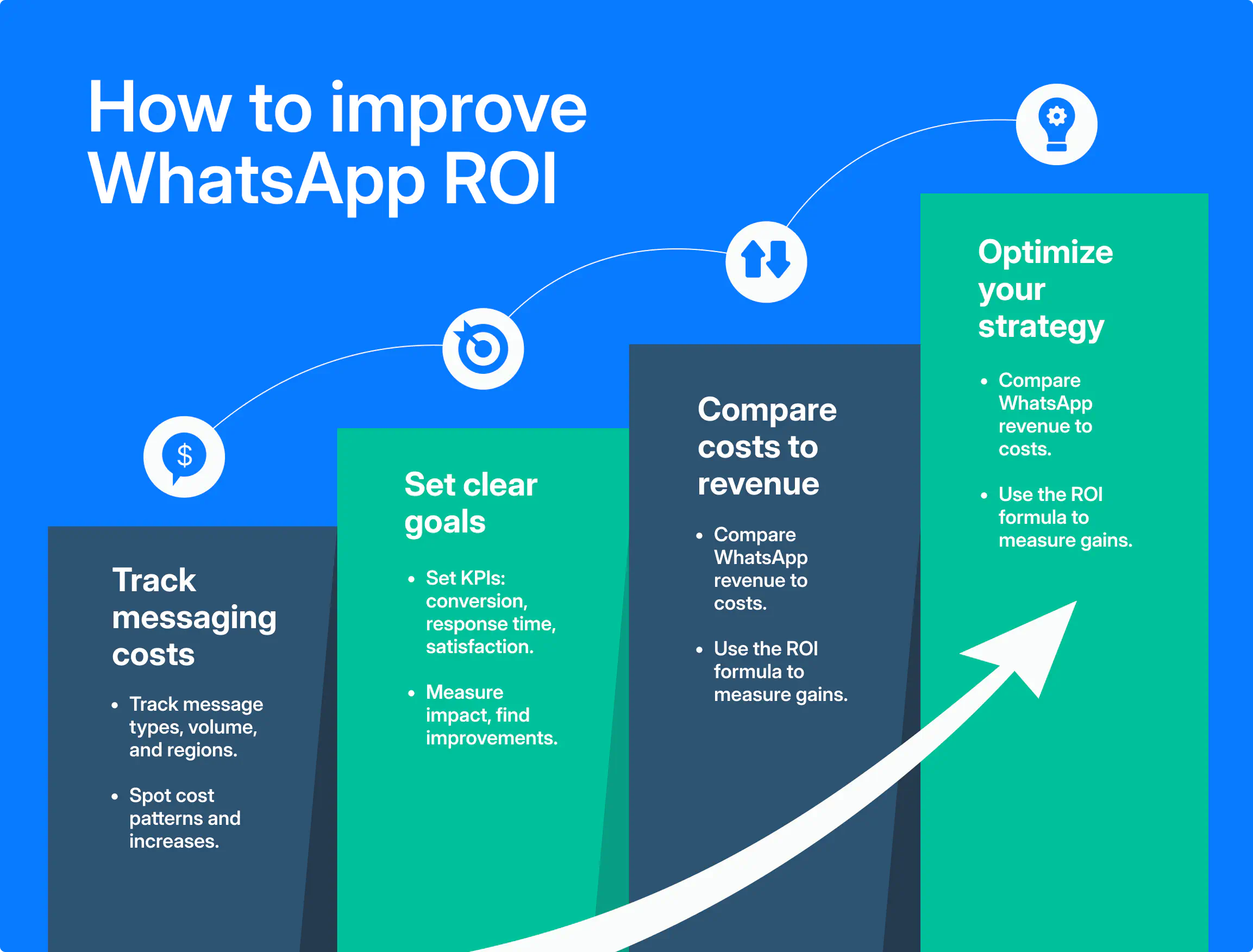
Evaluate the return on investment (ROI) for WhatsApp Business API by comparing the costs saved through these practices against the revenue generated from enhanced customer interactions.
To effectively measure the ROI, follow this guide:
Track messaging costs
Keep an eye on your expenses. Monitor what types of messages your agents send, the volumes, and regions. This will help you identify patterns and areas where costs are increasing.
Set clear goals
Define specific KPIs such as conversion rates, average response time, and customer satisfaction scores so you can measure how effectively your messages turn leads into customers. Use customer satisfaction scores to understand where your service might need improvement.
Compare costs to revenue
Analyze the revenue generated from WhatsApp engagements, like closed deals and repeat purchases, against the messaging costs saved using best practices.
Use this formula to calculate ROI:

Let’s say you have:
- Net revenue from WhatsApp interactions: $3,000
- Total costs: $1,300
The net revenue is the income generated through WhatsApp Business API, while total costs include both the API expenses and the monthly subscription fee for your shared team inbox.

With this formula, your ROI is approximately 130.77%. This means that for every dollar spent on WhatsApp interactions, you earn about $1.31 in revenue.
Optimize your strategy
Delayed outbound messaging increases the costs. When messages are sent outside the customer service window, each interaction incurs a charge. Additionally, bulk messaging can drive up expenses due to volume, especially with marketing messages, which are the most expensive type.
Gather customer feedback to adjust your strategy and prioritize messages that engage customers. When you keep the conversation live, you minimize the need to follow up with costly templates.
Final thoughts
Reducing WhatsApp Business API costs doesn’t have to be complicated. Focus on encouraging user-initiated conversations, automate responses with chatbots, mind the 24-hour customer service window, use Click-to-Chat ads, and keep your messages relevant. Follow these best practices and you’ll keep your expenses in check.
Your agents should be aware of the factors influencing WhatsApp Business API costs and how to communicate efficiently. Train your team to understand the new pricing model and to track key metrics that affect pricing. It will help you stay cost-effective without reducing customer engagement. It’s all about working smarter, not harder.
Get a free consultation
Frequently Asked Questions

Sarah is a B2B SaaS strategist and thought leader with years of experience in sales and market research. With a deep understanding of the WhatsApp Business API and its role in modern B2B communication, she writes insightful, opinionated pieces tailored for decision-makers in the SaaS industry. Drawing from her firsthand experience, Sarah is addressing sales team pain points and leveraging AI to streamline sales processes.

